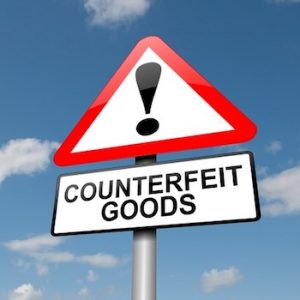 Today, the counterfeit trade no longer exists just through downtown city street vendors. Recently, the Internet has become a major enabler in the sale of online counterfeit products, ensuring anonymity and providing counterfeiters with access to a global market.
Today, the counterfeit trade no longer exists just through downtown city street vendors. Recently, the Internet has become a major enabler in the sale of online counterfeit products, ensuring anonymity and providing counterfeiters with access to a global market.
The proliferation of online counterfeiting is increasing and threatening any type of brand protection that companies employ. Counterfeiters are using sophisticated tactics to trick consumers and lead them to believe that certain counterfeited products are the real thing, causing websites to be seized by federal authorities.
In fact, the global counterfeit market has exploded in the past few years. Between 2008 and 2013, Organization for Economic Co-operation and Development (OECD )/ European Union Intellectual Property Office (EUIPO) showed an 80 percent global growth in counterfeiting.
A 2016 International Criminal Court Governmental (ICC) report estimates that the total value of pirated and counterfeited goods will reach between $1.9 and $2.81 trillion by 2022, and that’s without considering the wider economic and social costs. And, a 2016 study by Markmonitor found that keyword searches used by consumers on search engines brought up more than seven times as many counterfeit websites than genuine retailers. This online counterfeiting extends throughout Social Media as fake PPC ads that use authentic symbols drive people to their sites, another challenge to a company’s brand protection strategy.
Unfortunately, even when using a reputable online marketplace, there is still a chance of falling into the trap of buying counterfeit goods. For example, Apple claimed that 90 percent of genuine Apple products sold on e-commerce giant Amazon are counterfeit – leading them to sue Amazon supplier Mobile Star in October 2016. With sites like Amazon “comingling” its inventory, even the most vigilant consumer who avoids tfake websites may end up receiving a counterfeit item in the mail. This problem has been so substantial that some brands are no longer selling products or allowing third party merchants to list their goods on these channels.
The cost of counterfeiting for brands can be huge – millions or even billions can be lost to counterfeiters. So, brands need to understand how to protect themselves in the most proactive and effective way possible.
When it comes to counterfeiting, there is a critical need for companies and brands to remember state trademarks because often state law enforcement can provide help. Anthony F. Lo Cicero, Amster, Rothstein & Ebenstein LLP and seasoned trial attorney who has represented some of the most recognizable brands in the world, sat down with IPWatchdog to discuss the importance brands using state trademarks to protect themselves from counterfeiting.
A lot of counterfeiting has moved online as of late, and so have anti-counterfeiting efforts. Much of the activity today involves Internet monitoring (both human and autonomous) and then litigation to shut down offending sites and compromise the flow of funds to counterfeiters.
When it comes to a strategy for enforcement against repeat counterfeit infringers, Lo Cicero believes that only a multifaceted approach has any chance of success. “This involves Internet monitoring, use of take down mechanisms (like Amazon Brand Registry), action against web sites, ISPs, funds sources and the like, aggressive Customs enforcement, and litigation against all parties in the chain of counterfeiting,” he explained. “Of course, the precursor to all of this is the establishment of a robust IP portfolio.”
So, how can state law enforcement and prosecutors help?
Many states have statutes that make counterfeiting a state crime, but often only if the trademark is registered in that state. According to Lo Cicero, state registrations give local prosecutors and law enforcement officers jurisdiction – and they may be more able and willing to tackle local counterfeiters than are busy federal prosecutors. Thus, where budgets will allow and brand owners have significant counterfeit concerns obtaining state trademark registrations in at least several states, including California and New York, could be a worthwhile investment.
“Budgets are the reality today,” he said. “Brand owners and their advisors may have to prioritize their efforts against major distributors of counterfeiters only. But triage must be done with a scalpel and not a buzz saw, lest significant wrongdoers slip through the cracks.”
Lo Cicero shared a story with us about a recent counterfeiting incident in Indonesia:
“A major brand owner confronted a counterfeiter in Indonesia. The counterfeiter (wrongfully) obtained a registration. We challenged it and kept winning, but he was able to string out the process by filing multiple appeals, each of which stayed enforcement of the judgment below,” he explained. “He used the Indonesian registration to convince Japanese Customs officials that he was the rightful owner of the brand in Indonesia and since the goods coming into Japan were made in Indonesia, they were not counterfeit. We ultimately won in both countries, but it took years.”
These days, it is critically important to have these rights. Courts, prosecutors and even platform owners can only act if the brand owner has clear rights that can be enforced. He added, “There are no exceptions.”

![[IPWatchdog Logo]](https://ipwatchdog.com/wp-content/themes/IPWatchdog%20-%202023/assets/images/temp/logo-small@2x.png)

![[Advertisement]](https://ipwatchdog.com/wp-content/uploads/2024/05/Quartz-IP-May-9-2024-sidebar-700x500-1.jpg)
![[Advertisement]](https://ipwatchdog.com/wp-content/uploads/2024/04/Patent-Litigation-Masters-2024-sidebar-last-chance-700x500-1.jpg)
![[Advertisement]](https://ipwatchdog.com/wp-content/uploads/2024/05/Patent-Portfolio-Management-2024-sidebar-super-early-bird-with-button-700x500-1.jpg)

![[Advertisement]](https://ipwatchdog.com/wp-content/uploads/2021/12/WEBINAR-336-x-280-px.png)
![[Advertisement]](https://ipwatchdog.com/wp-content/uploads/2021/12/2021-Patent-Practice-on-Demand-recorded-Feb-2021-336-x-280.jpg)
![[Advertisement]](https://ipwatchdog.com/wp-content/uploads/2021/12/Ad-4-The-Invent-Patent-System™.png)







Join the Discussion
One comment so far.
André de O. S. Moreira
July 21, 2017 07:48 amInteresting point of view – thanks for that! Just to add another topic to this discussion, I believe that Private International Law has an important role in solving problems regarding IP infringement through the internet. If we have issues with trademarks, that must be registered, imagine the confusion with copyright infringement – a song played (w/o authorization) through streaming channels for instance.